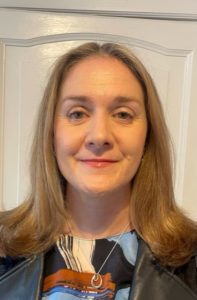
Dr Holly Hutson
Lead for Health inequalities and Population Health Bexley
My journey
I have worked in Bexley for 23 years as GP Partner, with specialist interests in Mental Health and Diabetes. I am a Governing Body member of Frognal PCN and PCAG representative. I have been a GP Appraiser and GP Trainer for 12 years. I have recently achieved the ILM-5 qualification in Coaching and Mentoring and am a GP Mentor for SEL Fellowship scheme.
In 2019, I started my first Clinical lead role for Mental Health in Bexley where I represented Primary care in the Community Mental Health Transformation Programme at SEL CCG level. I worked closely with colleagues in Oxleas, Mind in Bexley, and Bexley Care to set up new pathways for Mental Health services in Bexley and was involved in planning the Well-being hub and ensuring the voice of Primary Care is heard at all levels of discussion. I was involved in the planning stages of integrating the ARRS roles of Mental Health Practitioners for PCN’s in Bexley. I took part in the recruitment process and supported the role out of these new posts.
I have worked with Bexley CCG to improve the uptake of SMI Physical Health checks. This involved meetings with commissioners on data collection, incentive schemes and representing Bexley on the Steering Group for SMI Physical Heath Checks across SEL. I worked with Mind in Bexley on a Digital Health Project running webinars for SMI patients and carers to improve uptake Physical Health Checks and accessing health services.
Since August 2022, I took on the new role of Clinical lead for Health Inequalities and Population Health and have been working with Bexley Public Health team to tackle Health Inequalities in Bexley. Linking with my previous role as Clinical Lead for Mental Health, I have been looking at how ethnicity affects access to mental health care and support in Bexley.
The next challenge is to work with Local Care Networks (LCN’s) in Bexley to look at Health Inequalities needs in each LCN and focus the budget on local projects to improve the health and care of the diverse population of Bexley.
Key barriers & challenges
I was asked towrite a scrutiny report for Bexley Council on ethnicity and mental health. I didn’t know much about the scrutiny committee at LBB, so had to look at previous reports and agendas. I have been looking at the evidence from literature reviews, health intelligence and qualitative research. I have engaged with IAPT, Primary Care, SEL ICB and Oxleas to access local data, but this is time-consuming and challenging. Speaking to mental health practitioners, patients and carers helped to identify needs of this population.
I joined a focus group at MIND in Bexley BAME project, speaking with outreach workers and representatives from different ethnic community groups and churches. This needs assessment highlighted some of the barriers and challenges and identified areas for improvement to health and care and increase access to preventative mental health care.
In my role, I have attended PCN meetings, Public Health strategy meetings and still have involvement in Mental Health Transformation in Bexley. I will attend LCN meetings across the borough.
Organisational support to make this happen
I feel that it is vital to promote good mental health and support well-being services across Bexley for service users and hope that this can be integrated into the pathways. It is also important that we address inequality in healthcare and ensure that we reach out to populations that struggle to access health services due to barriers of language, culture, religion, disabilities, and poverty, so that we can truly make services accessible to all. As GP’s we are the ideal link between organisations for health and care as we provide direct care for patients and are in a position of trust and respect.
Top tips
I am passionate about improving mental health and well-being and reducing health inequalities for patients and their carers in Bexley. My top tips to make this happen are:
- Join meetings to introduce yourself and make suggestions for change.
- Arrange important meetings to fit around clinical commitments.
- Provide the Primary care input into redesign of services and pathways.
- Talk to and listen to colleagues in different health care organisations.
- Listen to patients and carers about their concerns and expectations.
- Use contacts in organisations to speak directly to make change happen
- Have a good data analyst colleague
